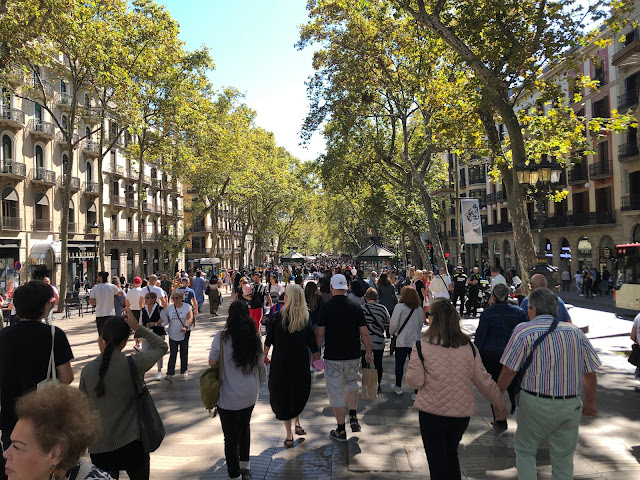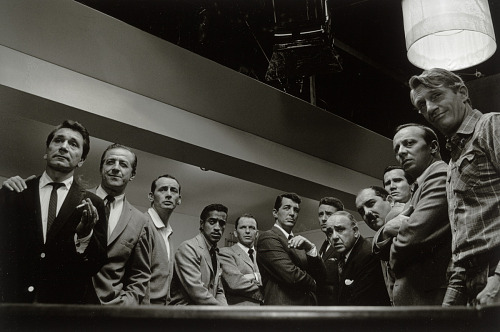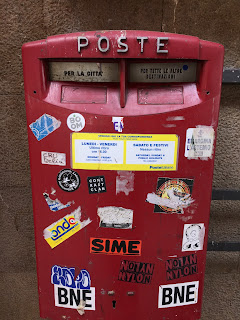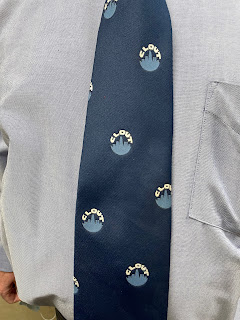 |
| Barcelona |
I was in Barcelona last October, crossing the Ramblas toward our hotel, one of those wide, wide intersections by Catalonia Square where armies of people come thundering across the street. I looked down at my feet, where the tiles were designed by architectural genius Antoni Gaudi, at the mobs of people, and cars, and bicycles, vibrant urban life, and had a thought I've been reluctant to put in the newspaper.
"Now THIS is a world class city!" Yes, Barcelona has more than a million fewer residents than Chicago (though Madrid has slightly more). And yes, that may have been the thrill of travel, of seeing new wonders, eating new foods in new places. But Chicago, in its reduced post-COVID, post-George Floyd form, hasn't gotten its mojo back. Something tells me a NASCAR race won't help.
What's a world class city? One that doesn't have to ask the question.
Yes, running down your home is never a good idea. The American returned from abroad who speaks with a slight accent and is gushing with unusual wonders — journalists get into museums free! — is a cliche, and a bad look.
That said, I thought of my moment in Catalonia about the third reader who said, "Give us a third column!" when I cut Hollywood director Michael Goi off at the end of my
second piece on our interview without going into detail about his putting Chicago in its place as a film capital. I started with the above observation because I didn't want to let Goi go anywhere I wasn't willing to go myself. It seemed cold compensation for keeping me and my readers fascinated for two days, maybe three, depending on how this turns out.
Though offering a civic reality check, however unwelcome, is one role of the journalist.
And there was something unusual about that interview. Since we talked on Zoom, I taped it, rather than typing as he spoke. The
first column of course related to his journey to Hollywood as an Asian-American, the topic of the moment. Transcribing to the recording, I wrote the interview, and it ran far too long. Normally, I'd have taken what I wanted, and not necessarily even listen to the rest. But I turned in the column — at over 1000 words, almost 50 percent longer than usual — then not only did listen, but kept typing it out, figuring I might use it later. When I finished, I clicked the wrong button and lost half a dozen paragraphs of his remarks. So I groaned, tapped my fist on the desk, and then listened again, and typed it again. That never happens, and what prompted me to write the second column, about interviewing for a job. I figured, why wait?
I could have sliced off the top, about the tension between ethnicity as a draw and a distraction, crowding out other aspects that are also of interest. Perhaps greater interest. But I like that line of thought. It doesn't get said enough during our Carnival of Identities. So I briefly summarized what he said about Chicago.
Four readers asked for a third column, even demanded it. That's a lot. So while I'm not a short order cook, here goes.
I asked Goi about raising kids in Los Angeles — he has three children, two teens and a preschooler. He agreed that raising children in Los Angeles can be a challenge.
"Personally, I'd rather live in New York City," he said "I think growing up in Chicago and not just dealing with the snow , but dealing with everything, it kinda makes you tough and makes you understand how to navigate different people and personalities. It's different if you have to take the 'L' and interact with people than if you are driven in a car to school as happens in Los Angeles. But this is where the film industry is, where dad's work is, this is where we are."
Goi sees an honesty in Chicagoans that might be harder to recognize among those remaining in the daily claw and grind of the city.
"Most of the people I work with who are from Chicago, a lot of us already knew each other, knew what we were all about," he said. "Part of the nice thing, there is no bullshit. You can't bullshit another Chicagoan. They'll see right through it. That's refreshing in a lot of ways. The fact you know when somebody tells you something, no matter how you don't want to hear it, you're hearing the truth. That's incredibly valuable. I appreciate that candid way of approaching things. I never feel there is anything I have to hide anyway, being able to talk to Tyrone Finch (producer of ABC's "Station 19,"actually hailing from Cleveland) or Joey Mantegna or Charlie Carner (producer, known for "Blind Fury" and "The Untouchables" TV series). Any of these people I know from Chicago in this business, we know they're not going to be any level of deception in our relationships."
 |
| Michael Goi |
Pretty to think so, as another former Chicagoan, Ernest Hemingway said. I would counter that the supposed Chicago attribute of savviness is at odds with the notion that Chicagoans are inherently honest with each other, even Chicago expats in a distant city. But that's what he said, and he obviously believes it.
The part that came next pricked up my ears, for being red meat in the water for film board booster sorts:
"The film industry in terms of the decisions being made in terms of what shows will actually be made is still based in Los Angeles," he said. "Everyplace else is a location, including Chicago. New York City, Atlanta, New Mexico, Vancouver. They're locations, They will pick up and travel to shoot at whatever place on earth is the cheapest to shoot in that moment of time. People deceive themselves in some locations. I remember when doing shows in New Orleans, 'American Horror Story.' New Orleans at that time was getting a lot of work, I did a seminar and said, 'As soon as you stop being the cheapest place on earth to shoot, all these productions are going to pick up and going to move to wherever is the next cheapest place on earth to shoot.' And it happened to them. They didn't think it was going to happen to them. It happened a year later. Atlanta, Georgia, enacted tax breaks that were much more favorable and everything picked up and left New Orleans and went to Georgia.
"In this industry, you accept being part of the traveling circus. If you are going to survive in this industry, you will be packed up and shipped out to wherever is the cheapest place on earth to shoot at that time. It sounds very glamorous: 'Oh wow, you've done two, three movies in South Africa. You're done two movies in Morocco.' It sounds very glamorous. It's more the reality of what you have to do to stay in this business and make a living in it. You have to be able to go work in these places."
I know nothing about making movies except that being on a movie set is like watching paint dry. But the above struck me as having what I call "the tang of veracity." It sounds entirely true. Anyway, I think I've gotten my money's worth out of my hour with Michael Goi. I can't say we got on — he was very dry, very professional, with zero interest in me or in chit-chat. But he had that rare quality of being honest and forthcoming, and I had to share it with you.





























